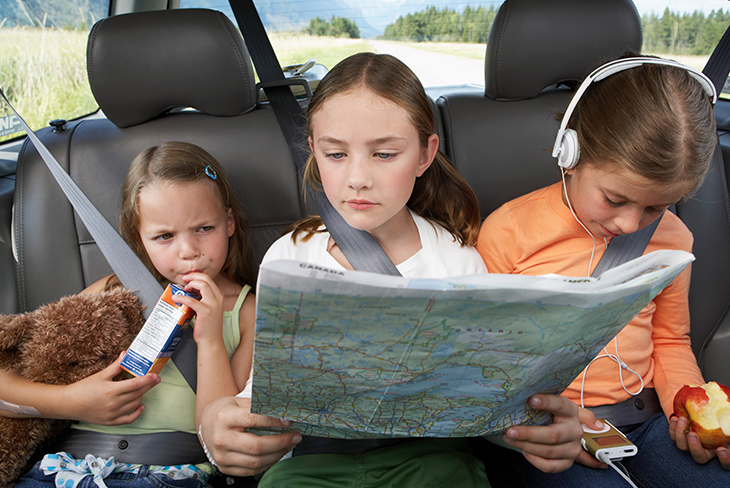11 tips for travelling with kids

Factoring a child’s needs into your holiday plans involves more than popping in a CD of nursery rhymes and scheduling toilet stops. Follow these tips for making memories, not migraines.
While they say that getting there is half the fun, all too often the stress of being away from home and the frustration of being confined to a car, plane or hotel room combine to turn a much-needed holiday into a painful experience for parents and kids alike. Here are 11 ways to make your trip a rewarding adventure for everyone:
1. Don’t rush
Whether at the airport, getting from one point to another, or simply sightseeing, the best thing you can take is extra time. Young children are blissfully unaware of the scheduling pressures of travel, so you’re more likely to keep your cool if you factor everything from toilet stops to tantrums into your time frame.
2. Pack snacks
A hungry tot is bound to get grumpy, so make sure you have plenty of snacks at the ready. Cut up fruit and snackable vegetables and have them on hand to offer both sustenance and distraction. But go easy on the sugar – hyperactivity and cramped spaces, like a car or plane cabin, generally don’t mix well.
3. Book the bed
On many (although not all) international flights you can get a bassinet – a little cot for infants up to a certain age and weight – that attaches to the wall in front of the bulkhead seats. They’re free, but you have to reserve them in advance. Rest assured, the payoff for your arms is worth the extra legwork.
4. Come clean
If you have to sterilise things regularly, consider taking a portable steam steriliser; they work well and with minimum fuss. For sterilising small items such as dummies or teething toys while you’re on the move, use sterilising tablets in a watertight screw-top container.
5. Perform under pressure
Barring outbursts, the most difficult parts of a flight are take-off and landing, when the change in altitude causes pressure to build up in the ears. Play a game of making funny faces or yawning at each other in order to stretch your little one’s facial muscles to relieve ear pain. Encourage him or her to nurse if breastfeeding, or have a bottle, sippy cup or juice box ready, as swallowing helps too.
6. Curb queasiness
Children aged two to 12 are particularly susceptible to car sickness, which is caused by mixed signals being sent to the brain by the eyes and inner ear. In addition to fresh air and frequent stops, a light snack before the trip may help to lessen symptoms of nausea, dizziness and fatigue.
7. Remember the medicine
It should already be on your travelling list, but having kids along makes carrying a small first-aid kit all the more vital: plasters, antihistamines and a bottle of paracetamol can prevent a lot of stress.
8. Keep bugs at bay
If you’re travelling to a country in which malaria is endemic, you’ll need specialist advice on the appropriate antimalarial medication. You’ll also need to take ample supplies of insect repellent, clothes to cover up in the evenings and mosquito nets, if necessary.
9. Be sun savvy
Children often get more exposure to sunshine than adults, especially if they’re strapped into carriers or on to a child seat at the front of a bike. Don’t skimp on the sunscreen.
10. Drink up
Kids dehydrate easily, mainly because they don’t drink unless they’re thirsty. Carry bottled water with you at all times and check your child’s urine every now and then – if it’s darker than usual, cloudy or particularly strong-smelling, they’re not getting enough fluids.
11. Above all, know your child
If your kid doesn’t do well in a pram all day, build long play breaks into your itinerary. If your child is fussy without a nap, don’t try to do without just so you can see the sights. Avoid forcing your little one to behave differently just because you are on holiday – it’s a recipe for misery all round.
Life Healthcare in case of an emergency
Emergency units are located at 41 Life Healthcare hospitals and they offer 24-hour emergency care, 7 days a week. Life Healthcare’s emergency medical service also employs paramedics in fully equipped response cars at seven of the units and offers free paramedic and advanced life support assistance to their immediate communities. For assistance call 0860 123 367 and one of the response cars from the closest unit (see units listed below) will be dispatched to you. There is only a cost if an ambulance is dispatched. Hospitals with response cars:
- Life The Glynnwood
- Life Springs Parkland Hospital
- Life Flora Hospital
- Life Fourways Hospital
- Life Rosepark Hospital
- Life Vincent Pallotti Hospital
- Life Kingsbury Hospital
The information is shared on condition that readers will make their own determination, including seeking advice from a healthcare professional. E&OE. Life Healthcare Group Ltd does not accept any responsibility for any loss or damage suffered by the reader as a result of the information provided.

